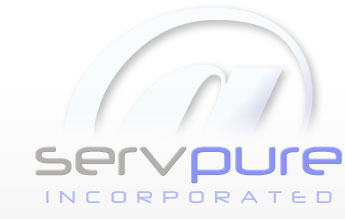 |

 |
 ACCEPTABLE USE POLICY
Version 1.2 - Effective April 1, 2007
ACCEPTABLE USE POLICY
Version 1.2 - Effective April 1, 2007
All Customers are responsible for reviewing and complying with this Acceptable Use Policy. Customers must affirmatively and contractually pass on the restrictions of this Acceptable Use Policy to their users, and take steps to ensure compliance by their users with this Acceptable Use Policy including, without limitation, termination of users who violate this policy. For the purposes of this Policy, "Provider" means ServPure Incorporated; the corporate divisions of MailPure and NamePure; and/or any other of ServPure's divisions; and "Customer" shall be defined to include Provider's customers and also Provider's customer's users and account holders. This Policy is subject to change with notice by publication of this Policy at http://www.servpure.com/legal. Customers are responsible for monitoring this website for all such changes.
Section 1 - GENERAL PROVISIONS
The actions described below are defined by Provider as "system abuse" and are strictly prohibited under this Policy. The examples described below are intended as examples only, are not intended to be exhaustive, and are provided solely for guidance to Customers. If any Customer is unsure of whether a contemplated use or action is permitted, it is Customer's responsibility to determine whether the use is permitted by contacting Provider via E-mail. The following activities are expressly prohibited, and Provider expressly reserves the right, at its discretion, to pursue any remedies that it believes are warranted which may include, but are not limited to, filtering, suspending, or terminating accounts, end-users or Customers that engage in system abuse and/or who refuse to address user abuse. In general, Customer may not use Provider's network, machines, or services in any manner which:
- violates any applicable law, regulation, treaty, or tariff, including but not limited to data privacy laws;
- violates the acceptable use policies of any networks, machines, or services which are accessed through Provider's network;
- infringes on the intellectual property rights of Provider or of any other person or entity;
- violates the privacy of others;
- involves the resale of Provider's products or services, unless specifically documented in a separate written agreement or in the initial Customer contract with Provider;
- involves deceptive online marketing practices including, without limitation practices that violate the United States Federal Trade Commission's guidelines for proper online marketing schemes;
- violates any specific instructions given by Provider for reasons of health, safety or quality of any other telecommunications services provided by Provider or by reason of the need for technical compatibility of equipment attached to the Provider;
- materially affects the quality of any telecommunications services provided by Provider; or
- otherwise violates this Acceptable Use Policy.
Prohibited activities also include but are not limited to, the following:
- unauthorized use (or attempted unauthorized use) or sabotage of any computers, machines or networks,
- attempting to interfere with or denying service to any user or host (e.g. denial of service attacks and/or DNS spoofing attacks);
- falsifying header information or user identification information;
- introduction of malicious programs into the network or Server (e.g. viruses, worms, Trojan horses, etc.);
- monitoring or scanning the networks of others without permission;
- attempted or successful security breaches or disruption of Internet communication including, but not limited to, accessing data of which Customer is not an intended recipient or logging into a Server or account that Customer is not expressly authorized to access;
- executing any form of network monitoring (e.g., packet sniffer) which will intercept data not intended for the Customer;
- attempting to circumvent Customer authentication or security of any host, network, or account ("cracking");
- Using any program/script/command, or sending messages of any kind, designed to interfere with a third party customer terminal session, via any means, locally or via the Internet;
- sending unsolicited bulk E-mail;
- maintaining an open mail relay;
- collecting E-mail addresses from the Internet for the purpose of sending unsolicited bulk E-mail or to provide collected addresses to others for that purpose;
- collecting E-mail addresses from the Internet for the purpose of sending unsolicited bulk E-mail or to provide collected addresses to others for that purpose;
- transmitting or receiving, uploading, using or reusing material which is abusive, indecent, defamatory, obscene or menacing, or in breach of copyright, confidence, privacy or similar third party rights;
- providing false or incorrect data to Provider; or
- attempting to circumvent or alter the process or procedures to measure time, bandwidth utilization, or other methods to document "use" of Provider's products and services.
Section 2 - WEB HOSTING
Provider's Web hosting customers who provide services to their own users must affirmatively and contractually pass on the restrictions of this Acceptable Use Policy to its users, and take steps to ensure compliance by their users with this Acceptable Use Policy including, without limitation, termination of the user for violations of this policy. Provider's Web hosting customers who provide services to their own users also must maintain valid postmaster and abuse addresses for their domains, comply with all applicable Internet RFCs, maintain accurate contact information with the InterNIC and any other appropriate domain and IP address registries, provide a 24/7 contact address to Provider for dealing with security and abuse issues, and act promptly to ensure that users are in compliance with Provider's Acceptable Use Policy.
(a) Servers and Proxies: Users may not run on Provider's servers any program which makes a service or resource available to others, including but not limited to port redirectors, proxy servers, chat servers, MUDs, file servers, and IRC bots. Customers are responsible for the security of their own networks and machines. Provider will assume neither responsibility nor accountability for failures or breach of customer-imposed protective measures, whether implied or actual. Abuse that occurs as a result of a compromised customer's system or account may result in suspension of services or account access by Provider, for example, if a system is abused after becoming infected with a trojan horse programs as a result of an Internet download or executing an E-mail attachment. Any programs, scripts, or processes which generate excessive server load on Provider's servers are prohibited and Provider reserves the right to terminate or suspend any such program, script, or process.
(b) Storing files: The storage of any program, utility or file on Provider's servers the use of which would constitute a violation of this policy is prohibited. For example, it is a violation to store hacker scripts, IRC bots, or spamming software on Provider's servers.
(c) Web Space and FTP: The Web space and public FTP space included with a Web hosting account may not be resold or used for adult-oriented material. Provider reserves the right to require that sites using Web or FTP space which receive high amounts of traffic be moved to other servers. Web pages and FTP files may not contain any material, text, or images, whether hosted on Provider's servers or "transclusioned" (images from another site displayed on the page) which violate or infringe any copyright, trademark, patent, statutory, common law, or proprietary rights of others. Web pages and FTP files may not contain links that initiate downloads of copyright infringing or other illegal material.
Section 3 - E-MAIL
Sending unsolicited ("opt-out") bulk E-mail is prohibited. Customers and users may not advertise, distribute, or use software intended to facilitate sending unsolicited bulk E-mail or harvest E-mail addresses from the Internet for that purpose. Customers and users may not sell or distribute lists of harvested E-mail addresses for that purpose. Customers who provide or make use of a service employing referral IDs will be considered responsible for unsolicited bulk E-mail sent by members of the referral ID service that makes reference to services hosted by Provider. Customers must be able to provide visible evidence from the UBE-advertised link that a member of their referral ID service has had their membership terminated. Sending unsolicited bulk E-mail from another provider advertising or implicating, directly or indirectly, the use of any service hosted or provided by Provider, including without limitation E-mail, Web, FTP, and DNS services, is prohibited and is grounds for termination of those services to Customers or users who engage in the practice. The following actions are likewise prohibited:
- Using E-mail to engage in harassment, whether through language, frequency, or size of messages. Continuing to send someone E-mail after being asked to stop is considered harassment.
- Using E-mail to disrupt (e.g., mail bombing, "flashing," etc.) is prohibited.
- Sending E-mail with falsified header information. "Munging" header information in Usenet newsgroup postings to foil E-mail address harvesting by "spammers" is acceptable provided that a reasonable means of replying to the message originator is given. Use of anonymous re-E-mailers is acceptable, so long as the use is not otherwise a violation of this policy.
- Sending E-mail with falsified or obscured information (e.g., encoded or "obfuscated URLs") designed to hinder identification of the location of what is advertised.
- Excessive posting, off-topic posting, or cross posting to Usenet newsgroups in violation of their charter or standards.
- Creating or forwarding chain letters, pyramid/Ponzi schemes, child pornography, and hoaxes
- Using the customer account to collect replies to messages sent from another provider which violate these rules or those of the other provider.
- The utilization of catch-all Email addresses or wildcard addresses for Customer's domain.
- The forwarding of E-mail from domains not serviced by Provider to E-mail addresses serviced by Provider, unless Customer has given prior notice to and obtained the express authorization of Provider.
- The utilization of server-based auto-responders. (E-mail client-based auto-responders are permissible, provided that such do not create excessive volume of E-mail on Provider's system and network and that such are protected from auto-response to spam and other unsolicited E-mail.)
The volume of E-mail received, scanned, or otherwise passed through Provider's system and network may not exceed 500 messages to any particular E-mail address during any 24 hour period, unless advance arrangements expressly accepted by Provider have been made.
Customers who operate bulk E-mail lists shall not generate more than 250 bounces per mailing or an undeliverable message rate greater than 10% of the total number of messages sent. If such a Customer operates a bulk E-mail list of more than 5,000 E-mail addresses, Customer must establish and maintain procedural safeguards which prevent the transmission of notifications from such list, including bounces, through Provider's system and network.
Customers who utilize automated scripting must establish and maintain procedural safeguards which prevent the delivery of more than one message per second and deliver a maximum of 500 messages during any 24 hour period through Provider's system and network, unless advance arrangements expressly accepted by Provider have been made.
Customers must establish and maintain procedures which prevent excessive generation of E-mail messages through automated processes in the case of error in the system of Customer.
Customers who send bulk E-mail to "opt-in" lists must first receive permission to do so, have a method of confirmation or verification of subscriptions and be able to show evidence of subscription for users who complain about receiving unsolicited E-mail. Customers are limited to 25 recipients per message sent through accounts hosted on Provider's servers, and may not exceed 250 recipients or 100 messages in any 24 hour period unless E-mail list services are utilized.
Customers who send unsolicited or otherwise unapproved bulk E-mail or otherwise implicating, directly or indirectly the use of any service hosted or provided by Provider will be charged the cost of labor to respond to complaints, with a minimum charge of $250.
Section 4 - DIGITAL MILLENNIUM COPYRIGHT ACT
It is the policy of Provider to respond expeditiously to claims of intellectual property infringement. Provider will promptly process and investigate notices of alleged infringement and will take appropriate actions under the Digital Millennium Copyright Act ("DMCA") and other applicable intellectual property laws. Upon receipt of notices complying or substantially complying with the DMCA, when it is under its control, Provider will act expeditiously to remove or disable access to any material claimed to be infringing or claimed to be the subject of infringing activity and will act expeditiously to remove or disable access to any reference or link to material or activity that is claimed to be infringing. Provider will terminate access for Customers who are repeat infringers. For our Web hosting customers, you must adopt and implement a Digital Millennium Copyright Act policy that reserves the necessary rights to remove or disable infringing material. If you believe that a copyrighted work has been copied and is accessible on our site in a way that constitutes copyright infringement, you may notify us by providing our registered copyright agent with the following information:
- electronic or physical signature of the person authorized to act on behalf of the owner of the copyright interest;
- a description of the copyrighted work that you claim has been infringed;
- a description of where the material that you claim is infringing is located on the site;
- your address, telephone number, and e-mail address;
- a statement by you that you have a good faith belief that the disputed use is not authorized by the copyright owner, its agent, or the law;
- a statement by you, made under penalty of perjury, that the above information in your Notice is accurate and that you are the copyright owner or authorized to act on the copyright owner's behalf.
Notices of claimed infringement shall be directed to Provider. When Provider removes or disables access to any material claimed to be infringing, Provider may attempt to contact the user who has posted such material in order to give that user an opportunity to respond to the notification. Any and all counter notifications submitted by the user will be furnished to the complaining party. Provider will give the complaining party an opportunity to seek judicial relief in accordance with the DMCA before Provider replaces or restores access to any material as a result of any counter notification.
|
 |

|
 |





